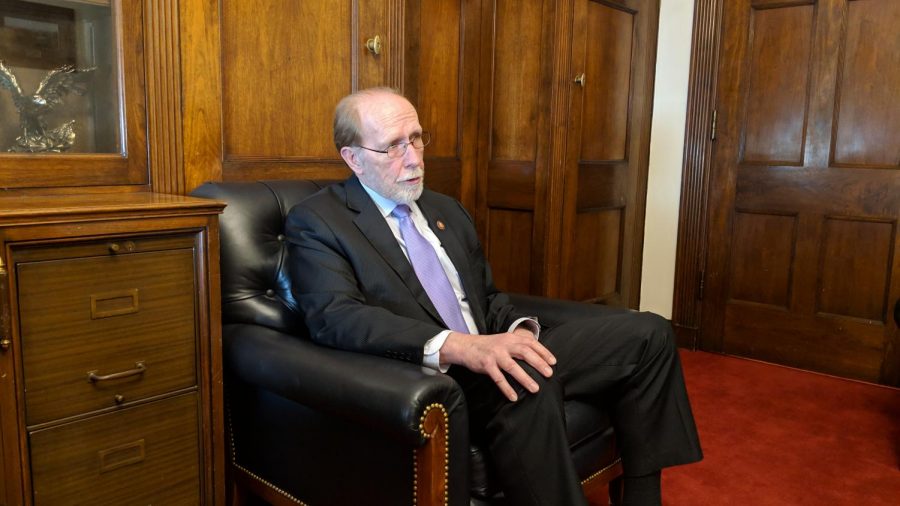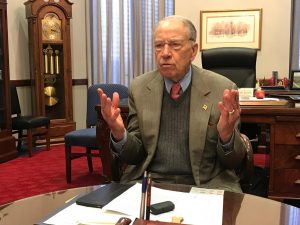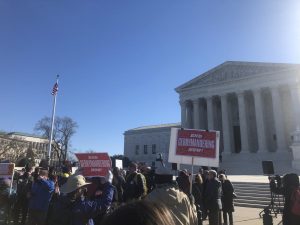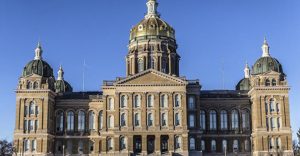Green New Deal not ideal for Iowa’s congressional delegation
Democratic members of Iowa’s congressional delegation are hesitant to endorse the Green New Deal.
Rep. Dave Loebsack, D-Iowa City, speaks with The Daily Iowan inside the Longworth House Office Building in Washington on Tuesday, March 26, 2019.
March 26, 2019
WASHINGTON — As the U.S. Senate rejected a resolution Tuesday commonly known as the Green New Deal, in interviews at the Capitol, Democratic members of Iowa’s congressional delegation hesitated to endorse the plan.
The 14-page nonbinding resolution calling for sweeping environmental and social changes has kept Democrats from more independent and rural districts from rubber-stamping the resolution.
The Green New Deal would push for aggressive congressional action to reduce the effects of climate change, including transitioning to 100 percent renewable energy sources as well as updating energy efficiencies in all residential and industrial buildings. It would back other changes such as raising wages and guaranteeing health care.
None of Iowa’s three Democratic representatives are among the 91 House cosponsors of the Green New Deal, but all have emphasized their support to address climate change.
Rep. Cindy Axne, a Democrat representing Iowa’s 3rd District, said she was focusing on more tangible solutions she can accomplish in the House Agriculture Committee.
“I totally understand we need to address climate change — we can’t do that with a White Paper,” Axne said. “We need to do that with appropriate laws and with actual tangible things we are doing on the ground.”
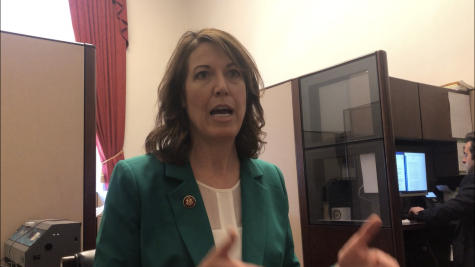
Axne, who was elected to her first term in November, said she supported such initiatives as a feed additive that would reduce methane gas by livestock in addition to technology that captures carbon from the air. One bill introduced in February, House Resolution 1166, aims to support carbon-capture infrastructure, but it hasn’t advanced.
Rep. Dave Loebsack, a Democrat representing Iowa’s 2nd District and a member of the House Energy and Commerce Committee, said he would rather see parts of the Green New Deal dealt with separately, such as environmental goals and income-equality goals.
Asked if he’d vote yes or no on the resolution if it came to a vote, he said he couldn’t say whether he’d support it.
“I’ll cross that bridge if we ever get to that,” he said.
The Daily Iowan will meet with Abby Finkenauer, a first-term Democrat representing Iowa’s 1st District, on March 27. In a statement to the Des Moines Register, Finkenauer said as a member of the House Transportation and Infrastructure Committee, she’s focusing on building infrastructure that reduces its carbon footprint and promoting renewable energy.
Iowa’s lone Republican House member, Steve King, was not available for an interview with the DI.
The House of Representatives, where Democrats hold the majority, hasn’t brought up the Green New Deal for a vote.
In the upper chamber, Senate Majority Leader Mitch McConnell, R-Ky., called for a vote on the resolution March 26, which forced many Democrats to decide whether to go on the record voting down or supporting the resolution. Rep. Alexandria Ocasio-Cortez, D-N.Y., who introduced the House version of the Green New Deal, called the move a “bluff vote,” on Twitter.
Instead of voting in favor or against, all Senate Democrats voted “present” except two Democrats who voted the resolution down.
Both of Iowa’s Republican senators, Joni Ernst and Chuck Grassley, voted no on March 26 on the Green New Deal.
In an interview March 26, Grassley said he believed sweeping changes would be too costly and the U.S. can address environmental concerns through allowing technology innovation and efforts such as wind tax credits already in place.
“It kind of comes to me like this from other people … ‘When are we going to have a program to fight global warming?’ ” he said. “I like to think, ‘Where have you been the last 30 years?’”
Just weeks ago, my Democratic colleagues outlined their vision for the future of American energy, the so-called #GreenNewDeal. Today, they had the chance to vote on that proposal, but instead we saw the #DemsDuck.
— Joni Ernst (@SenJoniErnst) March 27, 2019
Ernst took to the Senate floor March 6 to criticize the Green New Deal, calling it too costly and awarding it a “squeal award,” given to initiatives she believes are unnecessarily spending money.
“Everything from combines to fertilizers and trucks to transport grains to market would be impacted,” Ernst said in remarks on the Senate floor. “The Green New Deal is unrealistic and would unfairly impact rural communities across the country.”



